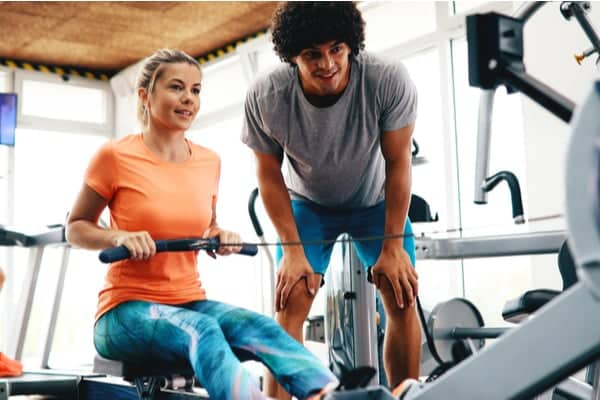
5 Things That Mess with Your Gym Confidence
When you walk into that shiny lobby, membership card in hand, the gym seems like an endless world of possibilities. Once you’ve spread out your mat amidst the sea of spandex-clad people, however, the gym can be a major confidence-drainer. After all, who wants to look at themselves in a solid wall of mirrors at the most exhausted, sweaty part of their day? If you associate the gym with feelings of intimidation and insecurity, you’re not alone: A recent survey found that women experience “gymtimidation” twice as often as men. Now is the time to build your confidence. Check out these five things that are sabotaging your gym confidence, and how to fix them.
Interested in Holistic Nutrition?
Are you considering a career as a holistic nutritionist? Or, perhaps you already have your credentials and want to know what the next step is to becoming a successful holistic nutritionist. Here are some general questions and answers you may find helpful as to why you may want to pursue a career as a holistic nutritionist.
Training Overweight or Obese Clients?
Read our six tips on how to effectively train overweight and obese clients.
A Protein Could Be a Key Weapon in Battle of the Bulge
More than one-third of people in the U.S. are obese. Obesity and its related health problems — including high blood pressure, high cholesterol, diabetes, insulin resistance and belly fat — affect so many, yet effective treatments are very few. In a new study, Simon Musyoka Mwangi and colleagues tested whether higher levels of a certain protein help fight the weight gain and health problems caused by eating the wrong foods.
The Truth About Belly Fat
Surprise: Everyone has some belly fat, even people who have flat abs. That’s normal. But too much belly fat can affect your health in a way that other fat doesn’t. Some of your fat is right under your skin. Other fat is deeper inside, around your heart, lungs, liver and other organs. It’s that deeper fat — called “visceral” fat — that may be the bigger problem, even for thin people.
Is Exercise One of the Missing Links to Mental Wellness?
The positive effects of working out extend far beyond the gym. As you might have guessed, physicians, researchers and mental-health practitioners have long discovered the positive relationship between exercise and mental health. More than a decade ago, researchers at Duke University released a groundbreaking study demonstrating that 30 minutes of brisk exercise three times a week is just as effective as drug therapy in relieving the symptoms of major depression in the short term, and also that continued exercise reduces the chances of the depression returning.
TRENDING ARTICLES
10 exercise cheats that blow your calorie burn (ABC News)
US Navy SEAL training flows into mainstream fitness (Reuters)
5 exercises for people who hate working out (The Huffington Post)
Growing research for instant impact of exercise in combating dementia (Health Club Management)
Researchers: Walk away from excess running (The Kansas City Star)
Don’t be left behind. Click here to see what else you missed.
Sport makes Muscles and Nerves Fit
Endurance sport not only changes the condition and fitness of muscles but it also simultaneously improves the neuronal connections to the muscle fibers based on a muscle-induced feedback. Scientists were also able to induce the same effect through raising the protein concentration of PGC1a in the muscle.
Amazing Results at One Fitness Gym’s Redesign
One Leisure St Ives is the largest of the five sites within the One Leisure portfolio and a recent major redevelopment program was completed in September, which included a brand new Impressions Fitness Suite. The project has seen the creation of a specific functional training area, which is supported by structured and engaging workout programming, delivered by Escape Training. The new-look space features the biggest ever Escape octagon and a full range of functional equipment to offer their members great variety and to ensure workouts are always fresh and challenging.
Looking for similar articles? Search here, keywords LOSING WEIGHT.
10 Surprising Things About Being the Healthiest Woman You Can Be
Women’s health issues don’t tend to be stand-up comic material. But that’s not to say we can’t have fun. So in the spirit of the recently passed April Fools’ Day, and in the ongoing interest of everyone getting healthier, we offer these sometimes silly, sometimes surprising and entirely no-fooling health tips and news bits.
Why Most Diets Go Wrong
All slimmers want to maximize their potential weight loss by eating the right foods and avoiding the wrong ones. According to research, however, the key to success lies in the timing of meals. A survey has pinpointed the best times to eat breakfast, lunch and dinner if you want to shed as many pounds as possible.
Exercising for Healthier Eyes
Age-related vision loss is common and devastating. But new research suggests that physical activity might protect our eyes as we age. There have been suggestions that exercise might reduce the risk of macular degeneration, which occurs when neurons in the central part of the retina deteriorate.
8 Ways to Burn Serious Calories That Don’t Feel Like Working Out
A recent late-winter skiing trip reminded us here at Healthy Living that there are lots of ways to get in shape that have nothing to do with the gym. And we don’t mean in the way that doing a few calf raises while you brush your teeth is technically adding more activity to your day.
Researchers: Walk Away From Excess Running
You’ve heard of the runner’s high. Researchers now want you to hear about runner’s plaque coronary artery plaque. In short: Running super-long distances for many years might backfire on you.
What Do You Listen to While Working Out?
Studies have shown that listening to music that fits the cadence of what you’re doing — running, cycling, aerobics — makes you work harder. “The metronome aspect, the synchronization of movement to music, is the most important,” says Carl Foster, director of the Human Performance Laboratory at the University of Wisconsin at Lacrosse.



